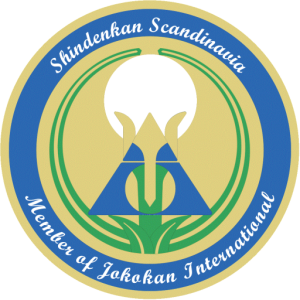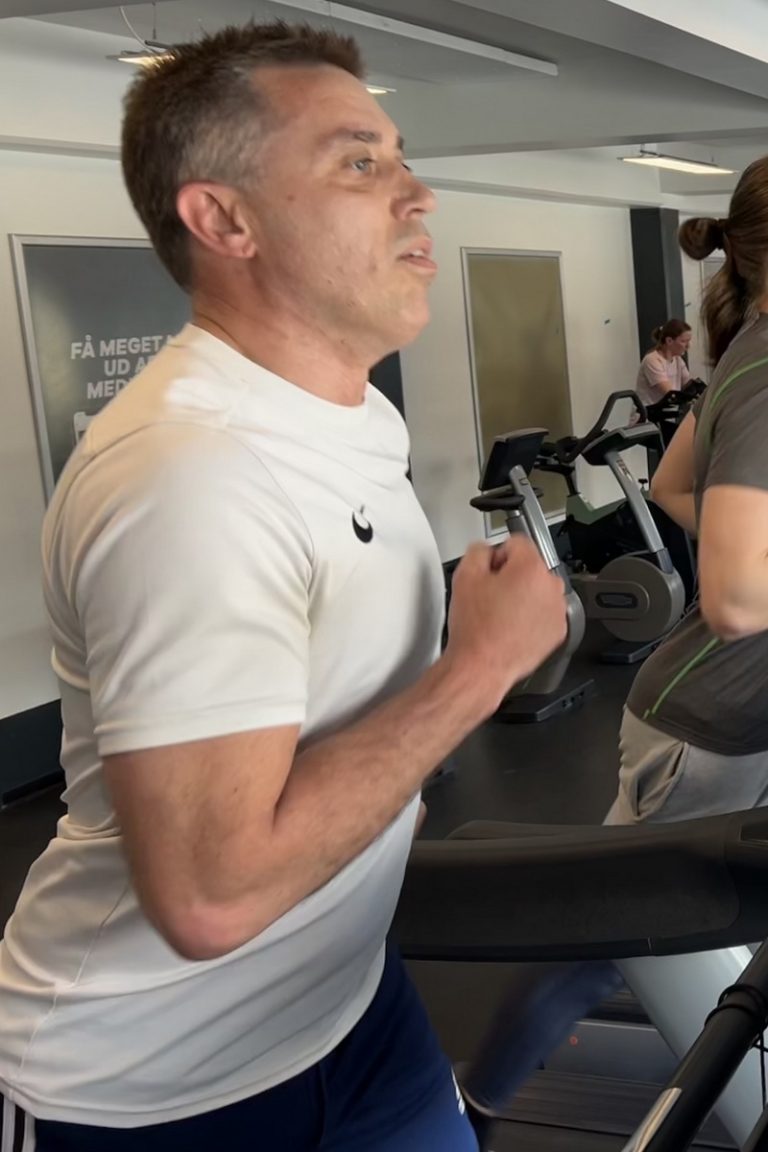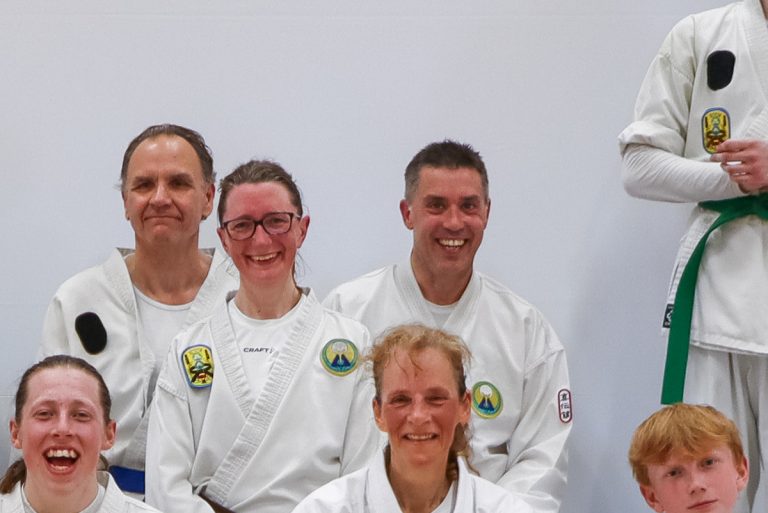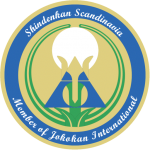
2. Kyu Graduation course You can if you want
From my experiences from my previous graduation to 3rd Kyu, I was fully aware that my graduation to 2nd Kyu would require a great deal of mental focus, presence and physical preparation, and not least that the demands would be greater.
At the same time, the family must also be prepared for the training to become more substantial both on weekdays and at weekends (which are otherwise dedicated to all the practical tasks that cannot be achieved in everyday life) and that I, for periods, will not be able to make the same contribution at home as normal.
Due to challenges on the home front with our son, who has both autism and ADD, I knew that it would require resources and acceptance from the family beyond the usual, as it sometimes requires a lot to make everyday life function more or less normally.
The process itself started mentally for me right from the start of the season, but when there are 6 months to the actual graduation for the Summer Meeting, there is gradually an increased focus on both the physical and the mental.
At the same time, it is there that you must be completely clear about whether you are ready to make the extra effort required to complete the course. If the right attitude is not there or you have a little too many excuses for yourself (and they will certainly come) for not making the necessary effort, then sooner or later you will have so many excuses that you interrupt the process.
About 3-4 months before the Summer Meeting, my son's situation significantly worsened and his schooling was in danger of being terminated and we had to file an appeal against the municipality, were in dialogue with lawyers and alternative school options, which took so much of the family's energy and mental surplus that I could not see at all how I could be present for the family and at the same time go through a graduation course on the side – I was very close to speaking out.
To put it mildly, it required a huge effort from the whole family and we agreed that I could continue the course if I was determined to make the necessary effort to pass and that I was there for the family when it was required, otherwise I would it will be wasted energy for everyone - I promised that and that's how it turned out.
The graduation process consists of 9 stop tests, all of which must be passed according to certain completely defined frameworks, so that it is the same for everyone. The nine stop tests for a 2.kyu graduation are as shown below:
- Physical test (Cardio + KataFIT 5S within time)
- SKK + KataFIT 10S within time
- Ryuha (Technical Curriculum)
- Ryugi in writing (Theory from the Syllabus Handbook)
- Ryugi orally (Theory from courses etc.)
- Shiai – Freestyle without rules (optional if you are over 50)
- Teaching and role model
- Passing OBC
- Stamina test (endurance test on pillow)
Especially when the physical control tests (or "Curling" tests as they are also called :o)) begin every fortnight, you quickly find out whether you have taken it a little too easy to get the basic shape in place, or whether you has the surplus to reach the target.
Persistence
Persistence – yes it can be defined in many ways, such as that I didn't miss a single training session during the whole season or as in the fact that I have always had an ambition to get better and to achieve a higher level of competence. Or as in my decision to make a difference for the other people according to Shindenkan's value set, which says, among other things, take responsibility for yourself and others.
I had a fairly clear feeling that my basic form was fairly good, as I do other sports alongside karate, but I still had to recognize that an extra effort had to be put in to reach my goals and preferably with a small margin, since you typically lose 10-20% when you are mentally stressed for the test itself.
Fortunately, it went well for both the Cardio, KataFIT and Ryuha tests, which meant that you felt motivated to continue to the next stop tests and the belief that a successful graduation was within reach, but the road had only just begun.
Where I definitely knew I had to make an effort was on the Ryugi (theory) itself, as I have great challenges in learning phrases, degrees and historical moments by heart, especially when the theory in certain cases, for me, seemed incomprehensible and I couldn't find a logical connection – That's how my brain is screwed up, anyway. That's why I started early on to find a method for how I could acquire and remember that knowledge, and I had to involve both my wife and children, who had to listen to me in the theoretical material (and a lot of it).
In the days leading up to the Ryugi test (there is an oral and a written one), I gradually felt fairly familiar with the material, I wasn't super optimistic, but sure that I could pass even if I was under pressure.
On the actual day of the Ryugi test, the butterflies started to appear and I suddenly think that I could not remember either one or the other. A slideshow was held for e.g. the structure of Shindenkan and SOPORG with a great deal of information which was diligently noted down as Kimu Sensei had indicated that there might be a question or two about the subjects.
When we started the test, a complete block occurred and what we had just gone through was completely gone. If I had been asked my name at that moment, I would have been in doubt - I myself was deeply surprised, as I make big decisions and lead other people on a daily basis, but suddenly I find myself in a situation where it all falls apart and that's super bad timing right in that situation!
Fortunately, the test ended with an approved result and just barely even, thanks to Kimu Sensei who reminded me that you have to believe in yourself and when I knew that I had prepared the best I could, the fog lifted and my breathing became fairly calm, but I was still surprised by my reaction, as it's not usually like me to react that way.
It was a huge relief and I now only focused on the next tests. It is of course easier said than done, as we do not know what lies ahead and the uncertainty itself is part of the process, as it increases the mental pressure that we have continuously been exposed to over a long period.
I didn't have to complete the Shiai test (freestyle) as it is not mandatory at the 2nd kyu when you are over 50 (and it says on my birth certificate that I am, but mentally and physically I am quite a bit younger 🙂 ). In return, I and a fellow graduate of the same age had the honor of giving the gas to two younger fellow graduates who really fought for the cause. The stop test is intended to reflect the reality we can all face when, for example, a violent assault where you have to fight fresh opponents until you can't take it anymore. It takes place under a completely controlled environment with a doctor present in case of an accident, but you become so exhausted that the shell you normally hide behind is completely gone, and your personality comes out. It is only at that point that you get to know yourself and you build on - if you can and want to. Many people don't like to see that side of themselves and can get scared and choose to stop karate altogether.
The next stop tests had to be passed at the Summer Meeting itself and even if the previous tests have been passed, there is no guarantee that the graduation is over. All tests count and Kimu Sensei makes all graduates aware that we now stand on our own two feet, i.e. that if one of the stop tests is not completed during the event, he cannot "hold his hand" over us and you have to accept that you will not graduate if one or more of the tests are not passed.
The convention includes, among other things stop tests as a role model, the stamina test and not least the OBC which requires a great deal of physical and mental focus, as you must be able to complete all the armed and unarmed courses you have gone through and at a time when you are mentally and physically exhausted .
The OBC test I felt was probably the worst thing I've done, but it's no use taking the negative thoughts onto the floor and saying "ouch" when you do something wrong - It's only the "Yes" hat that can be used for something constructively and you must do the best you can even if you are tired.
In the end, only Kimu Sensei can assess whether you know your syllabus, and fortunately it turned out that I could, which you don't get to know until your name is mentioned during the distribution of belts and stripes.
The last test is the stamina test, which must test one's endurance and attitude by punching and kicking a pillow together with one's partner - whether you want to or not, even if your strength is completely exhausted. It's an ultra-hard test, and in the last phase of the test you don't actually notice that the audience is standing and cheering and shouting - You're completely in your own time and are only focused on hitting and keeping the pace until Kimu Sensei says stop (which you also don't notice until your partner tells you).
Fortunately, the last tests went well and only when your name is mentioned do you know that the graduation has been successful and that the efforts you have gone through have been worth it.
A huge relief goes through one and not least pride that one has completed the journey. It may sound strange, but it is a journey of knowing one's limits and challenging oneself to the limit and a little more together with some fantastic people who also make it fun to spar with and who you have been able to rely on - It gives a unique togetherness and community.
What I am most proud of is my family's support at the same time as the challenges we had and still go through in connection with my son. It has required an effort and understanding far beyond what can be expected and I appreciate that immensely and it fully proves that anything is possible if you want it to be.

































